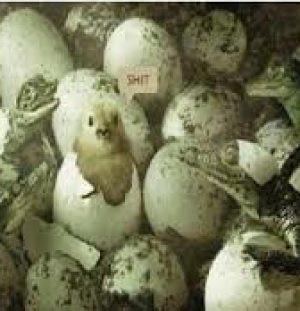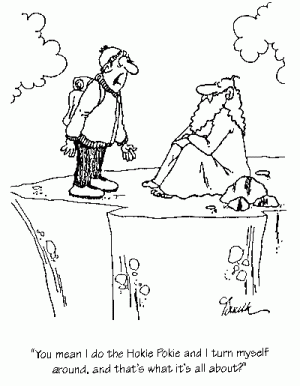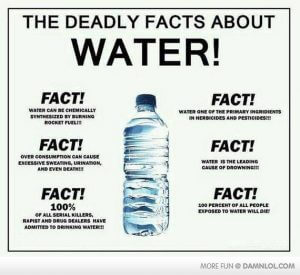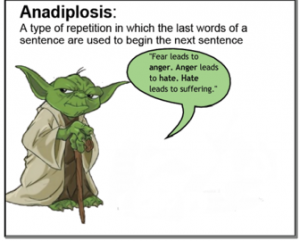Podcast: Play in new window | Download
 Slow is better, slow is not better…
Slow is better, slow is not better…
First off: what is a fallacy? A fallacy is a belief, a behavior, a theory that is based on a premise, an argument that is mistaken. The low truth value of most science, economic theories, spiritual teachings, or most non-fiction book is because of this: the premise, the foundation, the argument is mistaken. The fact that someone got a Nobel Prize only shows that this is hidden from plain view.
This article will deal with one unsound argument, one premise that is false but invisible.
When T. Harv Eker said: when something is not working, there is something you don’t know… The “something you don’t know” is always from the invisible. ALWAYS. And more often than not, it is a premise, undebated, unconscious, taken for a fact.
So, here you go: the title says it all: it is believed that slow is good. That slow is “mindful”.
 You may think that the way to get to perfection is through slow.
You may think that the way to get to perfection is through slow.
You may think that the way to get present, out of the mind, really experiencing the world through your senses needs to be a time consuming, meditative, slow-mo activity.
You do things really slowly, but in your mind, you want to get through it: you are in hurry mode.
I used to buy cars that were habitually slow… and then I spent a few months making them fast again. The nature of the car is a certain speed, definitely not slow. Slow driving a naturally fast car kills it.
I just went for a walk to ponder this fast-slow conundrum, and found that i want to slow down because my legs hurt, especially my injured left leg. But I also found that it hurts equally when I walk fast. So I walked fast. Hm. WTF. Same pain, more results.
Doing things slowly is actually forceful. Actually violent. Actually against nature.
Unless you train yourself to be precise, observant, AND fast, you’ll never amount to much.
Training is difficult to explain. Why? Because if you bring your worldview that only slow is precise, or that you are slow, you will think fast is hurry. Sloppy. Superficial. Imprecise. Shabby. It isn’t necessarily so.
Slow can be equally shabby, imprecise, superficial, sloppy.
In fact, when it comes to natural things like snapping to attention, walking, dancing, reading, listening, the faster you do it, the more precise you become.
Slow allows you to be in your mind, and wander, and never be really present, never be really in reality, never be in the here and now, never get anything done.
Of course, fast needs to be built up to. It takes conscious, deliberate practice.
You watch where you are slow, tentative, and you build a “routine” around it.
One of my previous occupations was magazine publishing. Creating it on the personal computer… and then the magazine was printed on printing presses.
 I went through a lot of employees. They were slow, and their speed didn’t improve.
I went through a lot of employees. They were slow, and their speed didn’t improve.
I am fast. Not because I am smarter, but because of deliberate practice. Conscious practice. Improving, consciously, every single time I do a task. Whatever the task is. Reading, writing, researching, designing, everything. Really? Yes, really.
I push the envelope. There is no other way to live and call yourself an expanding person… after all you are not expanding.
In fact, you can safely call yourself a shrinking person… you probably are.
One of my students, who was trapped in “slow is the only way” or “I am slow” is now going to train himself to become fast, or at the minimum: normal.
I recommended that he starts with reading. Increasing the uptake speed, while increasing the retention.
Retention means: he will be able to use and benefit from a larger percentage of a book than he is now.
‘Slow’ artificially segments the intake… the coherence, the connection, the logic, the theme gets lost… the fabric of the content is separated into single threads: the fabric disappears.
No rhyme, no reason, no benefit.
The way to read effectively is to emphasize the mechanics, and trust the brain to get what it gets.
I compare it to taking a shower. You make sure you turn this way and that to get the water everywhere, underarm, etc. You don’t follow every water drop and get busy with that: you trust… OK, I trust. But you can learn to trust.
Most everything you ever wanted depends on your speed. Speed without hurry. Speed and presence. Speed and getting faster.
I have seen people eat. Someone must have suggested that they eat slowly. So their jaws move really slowly, and it takes them an hour to eat a bowl of whatever. And yet their digestion suffers, their pancreas gives in, grows cancer… they are following some Tree of Knowledge b.s.
I can feel their minds struggling with being present. Slow is antithetical, (directly opposed or contrasted; mutually incompatible.) to presence. The mind wanders.
The real “rule” of eating is: chew thoroughly and be present to the taste, the texture, and how it fulfills your need for nutrition. FAST, but chewed.
Most people are either slow and mindless, or fast and mindless. The chewing is not conscious. The fast and mindless overeat. And has indigestion because of the unchewed food or the overeating.
The slow has indigestion because they don’t pay attention, their minds go to hatred or judgment, or some other unrelated stuff.
Same with sex…
Same with work…
Same with everything.
You never learn to think, for example, you never learn to see anything consciously or unconsciously, so you can make good decisions. So, when offered a choice, an opportunity, you can’t think, and make rash decisions, just to be over the discomfort of “I have no idea!”
You can’t practice everything. You need to start at some place… and learn how to make that one thing faster and better.
I like reading as a practice…
 Once you get good at reading, you should take on listening better next. That used to be a little weak for me, so I have been practicing it diligently. Not easy… the mind, the attention, the faster world does everything to take you out of listening… But I am getting better.
Once you get good at reading, you should take on listening better next. That used to be a little weak for me, so I have been practicing it diligently. Not easy… the mind, the attention, the faster world does everything to take you out of listening… But I am getting better.
I have also been practicing methods of getting better at Freecell… a computer card game, and I have found that if somebody watched me play, they would think I am a magician. I see faster, wider, deeper and solve, with ease the most impossible looking “puzzles”…
I have taken playing Freecell to unconscious competence, but I am adding new moves to it every day.
But if you never increase your speed, your unconscious competence will never come.
And Life is fast… and you are left behind. Clueless.
You won’t make things happen, you won’t really observe because you didn’t learn to see, and you’ll be that 99% who asks: what the hell happened?
So as you see the attention, the focus, and intentional concentration is missing.
I am recently combined some 12 videos to make an hour long one by Matt DiMasio. I downloaded them from youtube. You can now watch them whenever you want without commercials on my mobile app.
This link takes you directly to it, if you have an account on my mobile app, or to registration if you don’t yet have one. It is free.
Open the link on your mobile, or scan the image on it, if you opened it on your pc… and follow instructions.
https://yourvibration.com/instant
If you prefer to watch 12 videos and constantly be interrupted by ads, you can also watch it on youtube. Your choice.


